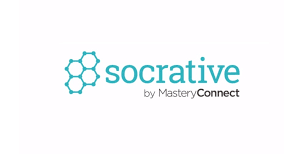Teaching--especially in the post “No Child Left Behind” era--seems to be filled with assessments. Teachers, parents, schools, and states want to know more and more about what their students know, it seems, than ever before.
What seems to get lost in the chaos of all this testing, however, is that assessments should be used to drive instruction.
And assessments can be time consuming--to give, to distribute, to grade, and to analyze.
 Teachers need to be able to quickly and efficiently make decisions in their classrooms based on reliable data.
Teachers need to be able to quickly and efficiently make decisions in their classrooms based on reliable data.
Here’s where apps like Socrative begin to play a role.Essentially, there are four kinds of assessments you can distribute through Socrative.
- A Quiz: an assessment you design beforehand (with only open response, multiple choice, and true/false questions available, so keep that in mind).
- A Space Race: a game where using one of your quizzes, students can collaboratively compete against one another
- An Exit Ticket: a pre-designed, three-question quiz that creates a very general “out the door” check for understanding.
Data is collected on a grid, which you can use to analyze individual student answers or aggregate classroom trends. One nice touch is that you can export this data to spreadsheet-ish (that’s an adjective, right?) programs as well.
Let’s go over the big stuff:
- Price: Free (there’s a paid Pro version for $59.99/year)
Looking at what the pro version offers, I would say it might only be useful for in the collegiate environment, and even then, only for large-scale classrooms. You can read the specifics yourself, but at the end of the day, I’d stick with the free option.
- Ease of Use and Applicability: Socrative would get ⅘ stars on this, that is, if Yelp applied to internet apps.
However, if you’re wanting to push the boundaries of assessment, such as more variation of question types; the ability for students to complete warmups/exit tickets in a flipped classroom; and have students be able to revise their answers once they’ve received feedback, I recommend you start to look at apps besides Socrative. Think of Socrative like a practical, general-use car. It’s got lots of features that are included for free (always a plus) and gets you from Point A to Point B, but it’s not equipped for drag racing.
Give Socrative a try! https://www.socrative.com/ If you’ve used it in your classroom and have a story or some feedback to share, leave a comment below. Until then, happy assessing!
-- Nate

Comments
Post a Comment